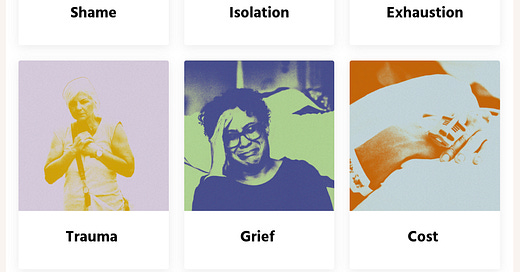The Motherhood Pain Hexad
These six "umbrella" motherhood problems feed each other.
“Umbrella” is a term that refers to other, more specific things that fit under these broader categories. I believe that all motherhood problems fit somewhere under these six umbrellas.
Shame creates isolation, which creates exhaustion, leading to trauma, resulting in grief and an analysis of what we’ve paid or lost (our cost).
I'll explain how I think they work together and then suggest ways to combat them in our motherhood journeys.
SHAME
Shame is the most important feeling to implant within us by people who benefit from our free labour in the background of society. The shame acts like buttons. Once the buttons are installed, they're difficult to uninstall and they're so easy to push, causing us to retreat into the background. We're fed narratives about womanhood. We're promised rewards if we buy into the narratives. The messages come to us through our culture and get perpetuated by other women who buy into them. We experience mom shame as technicolour woman shame. Believing we're unworthy of love and belonging, we don't petition for our needs and we don't take up space. The rest of the problems—isolation, exhaustion, trauma, grief, or cost—naturally follow.
ISOLATION
Our shame isolates us. We don't feel like we can ask for help because it will mean we're not the "supermoms" we're supposed to be. The shame leading to isolation makes us exhausted as we try to do everything ourselves. The more we fail to meet our expectations, the more shame we feel, the more we self-isolate physically and psychologically, and the more exhausted we feel by trying to do everything alone. The more exhausted we feel, the more we experience conflict in our relationships. This also compounds our exhaustion.
EXHAUSTION
When exhaustion compounds, we're less able to show up in our mothering the way we want. Exhaustion can lead to physical and mental health problems. We're then less able to be the daughters, sisters, partners, employees, or mothers we want to be. We can make mistakes. Sometimes, really big mistakes. If we end up losing a friendship, a marriage or partnership, a job, or a promotion, we experience trauma. Even the mere passing of time and our own aging is felt as trauma if we get so lost in our roles as moms that we forget we had goals for ourselves as individuals.
TRAUMA
We're often looking ahead to an age when our children will be more self-sufficient. We wish away the present moment more than we mean to but we're just trying to survive. Once our kids are teens, we're grateful for how their independence frees our time but we can be surprised by how much more emotional this parenting stage is for them and us, especially if we're also caring for ageing parents. The more our children separate from and express displeasure with us, the more trauma we feel, especially if we over-invested in mothering.
GRIEF
The trauma turns easily to grief over not having the motherhood experiences we expected. We weren't the moms we thought we'd be. We didn't give our children the lives we imagined. If our children grow up with complaints and criticisms, we might feel grief as we think about the needs and desires we had to sacrifice just to fail to meet their needs, or to meet social expectations, or to give them gifts they won't be able to recognize for another 20 years. The standard changes with every generation, so that by the time we're done raising our children, we inevitably didn't meet the new standard we couldn't have known about when they were young. Failure, to some degree, is inevitable. And it will break our hearts.
COST
We're left to survey the cost: The careers we couldn't choose because they weren't family-supportive. The promotions we lost out on. The degrees we couldn't finish. The activism we couldn't do for lack of energy and time. The pelvic floor we had to nearly obsess over to repair, if we ever did. The friendships we lost because our friends didn't have children; they couldn't tolerate our phone calls always being interrupted by the kids, or by plans having to be loosey-goosey, or simply our inability to relate anymore to each other. We note the romantic relationships that might have been dreamy but they didn't want children. The places we couldn't work from or live in because the children needed consistency. The places we couldn't live because of a divorce and shared custody. We have time when they're grown, in theory, to live places and do things. But we're older and our options are limited by our health, age, and finances. Not everyone experiences the same costs but nearly every mom experiences a high cost somewhere. As she surveys her decisions, her losses, her sacrifices, she might blame herself for not having figured out how to "do it all" or for not having got the results she expected. She circles back around to shame.
And they cycle through generations.
The more deprived our children (especially our daughters) feel as they reflect on their upbringings, the more determined they are to do more and be better. Having no idea yet just how much motherhood is rigged for failure, judgment, and abandonment; wanting so badly to undo generational trauma (or even prove their mothers blameworthy); they will feel even more exhausted and isolated than their mothers did raising them if they try to out-perform.
For every generation, the standard for excellence has become loftier and less realistic.
It's not a coincidence in the millions. It's a scam.
It's not everyone's story, but it's horrifically common.
No matter how many millions of moms share these experiences and have these feelings, blame will be directed at them as though they coincidentally all share these experiences and feelings while living together in a shared culture. In Slay Like a Mother, author Katherine Wintsch writes,
"It's easy to blame your micromanaging boss, the hyperactive PTA president, your son's teenage antics or your partner's missing sensitivity chip for the stress and pressure that's been building for years, but they're not the root cause. The demands of a busy life are taxing, but they don't exhaust your soul. It's the warped belief that you can and should be doing more that's keeping you down."
She goes on to cite her own "unrealistic expectations," "inability to say no," and her pursuit of performance. Still, when she realizes that she's not alone when her own research turns up millions of moms sharing her experience, this doesn't bring her to the conclusion that social design is at work. She doesn't draw attention to anything systemic at play.
Sometimes, I listen to podcast hosts discuss mom shaming, and I read advice books for moms. Every time, I'm left frustrated at how many women are at the brink of clarity but never quite reach the climax (ahem) where they'll set themselves free! How effective has our collective brainwashing been if we all conclude that we each have to hold ourselves individually accountable for our mom shame?
Sure, we're each responsible for addressing the mom shame that drives our perfectionism and needs to perform as "good mothers." But "responsible" is not the same thing as "accountable." Did we all just decide to have "warped belief[s]" that we "can and should be doing more" because you're a silly goose and I'm a silly goose and everyone you know is a silly goose?
When every woman in a town starts dying of cancer, should we address them as individuals who coincidentally all got cancer? Should we ask them each what they're eating? Should we tell the ones who are smoking that it's the smoking causing their cancer, and the ones who eat French fries that it's the French fries, and the ones who drink too much that it's the alcohol? If an entire town of women dies of cancer... shouldn't we ask,
"Who is poisoning the women?"
If moms are being poisoned, no good mental habit is going to fix their mom shame. There's no "warped belief" they can just choose to disbelieve that will fix everything.
Yes, our self-expectations are a problem. But why do we maintain these expectations? Where do they come from? Who benefits from us having them? In the wise words of Selena Gomez, "Who said? Who said you're not perfect? Who said you're the only one who's hurting?"
No, your "micro-managing boss," your partner, parents, or friends are not to blame—not ultimately. But they can perpetuate an anti-mother culture, whether they mean to or not, and they should be held accountable for the ways they contribute to a toxic culture.
Then, ultimately, the ideas that pervade our culture that cause us all to act in anti-mother ways come from systemic power structures and philosophies. It's the governmental bodies, the churches, the schools, the businesses who all benefit from mothers hustling themselves to death to create healthy, happy, productive citizens these systems need to thrive. They need our children. They benefit from high-quality parenting that produces high-quality adults. And they benefit most if we do this labour for free and constantly self-rebuke ourselves for not being perfect enough.
They are the dragons we need to slay.
Not our kids.
Not ourselves.
Not other mothers.
Everyone who profits off of our free labour needs to start paying.
Everyone who feeds our mom shame needs to learn a new song.
Everyone who concern-trolls us—"I'm just worried about her kids....."—to justify their judging, shaming, or interrogating needs to offer help. If they're so invested in a specific outcome, let them show it.
To address this Motherhood Pain Hexad, we need to start with mom shame. It's the most difficult problem to undo, but if we make strides there, the other pain points will self-solve in some cases. For example, if a mother is exhausted because she feels like she can't ask for help because she's been shamed, becoming resistant to that shame will enable her to feel comfortable asking for help, which will reduce her exhaustion.
To address mom shame, we need a three-pronged approach:
1. we heal ourselves;
2. we offer fierce compassion, relentless grace, and tangible support to each other;
3. we force the broader culture into revolutionary change.
I don't personally know a group of people more exhausted than mothers. But I also know that we're the most motivated to change the world because we want good lives for our kids. Moms share an unspoken bond of knowing and compassion like no other group of people I've ever met, and we are the do-iest of do-ers.
We just need to get on the same page and get strategic with shared understanding, shared values, and shared tools.
Undoing Motherhood can be the liberation movement you've been waiting for—a true collaboration of individuals, businesses, and social work organizations who strive in any way to improve the conditions for mothers and children, guided by the same values.
If we organize, amplify each other's work, support each other's needs, and agitate for social change, we can change how mothers experience motherhood.










